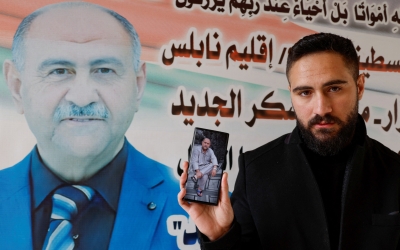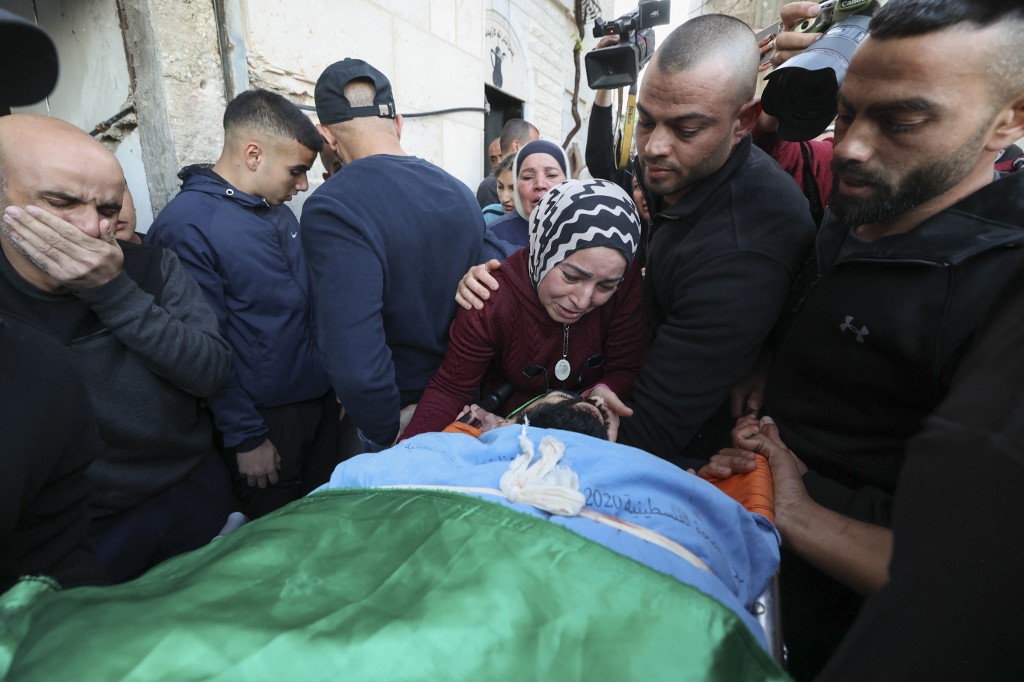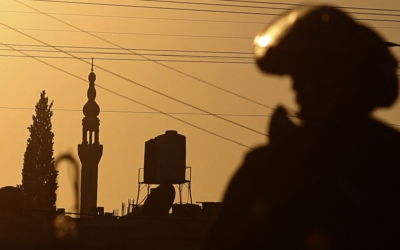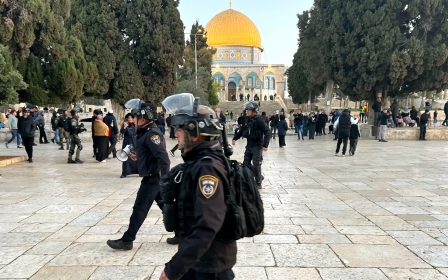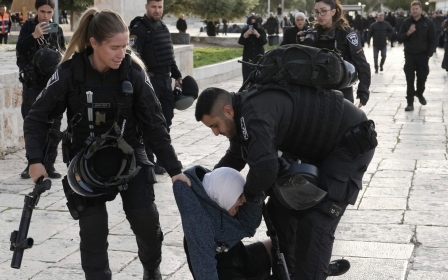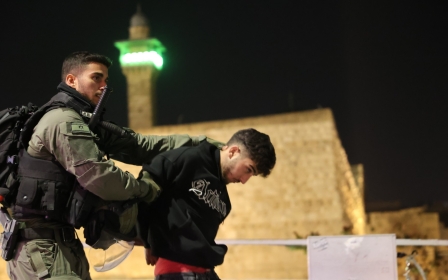Undercover in broad daylight: Israeli military raids in West Bank cities
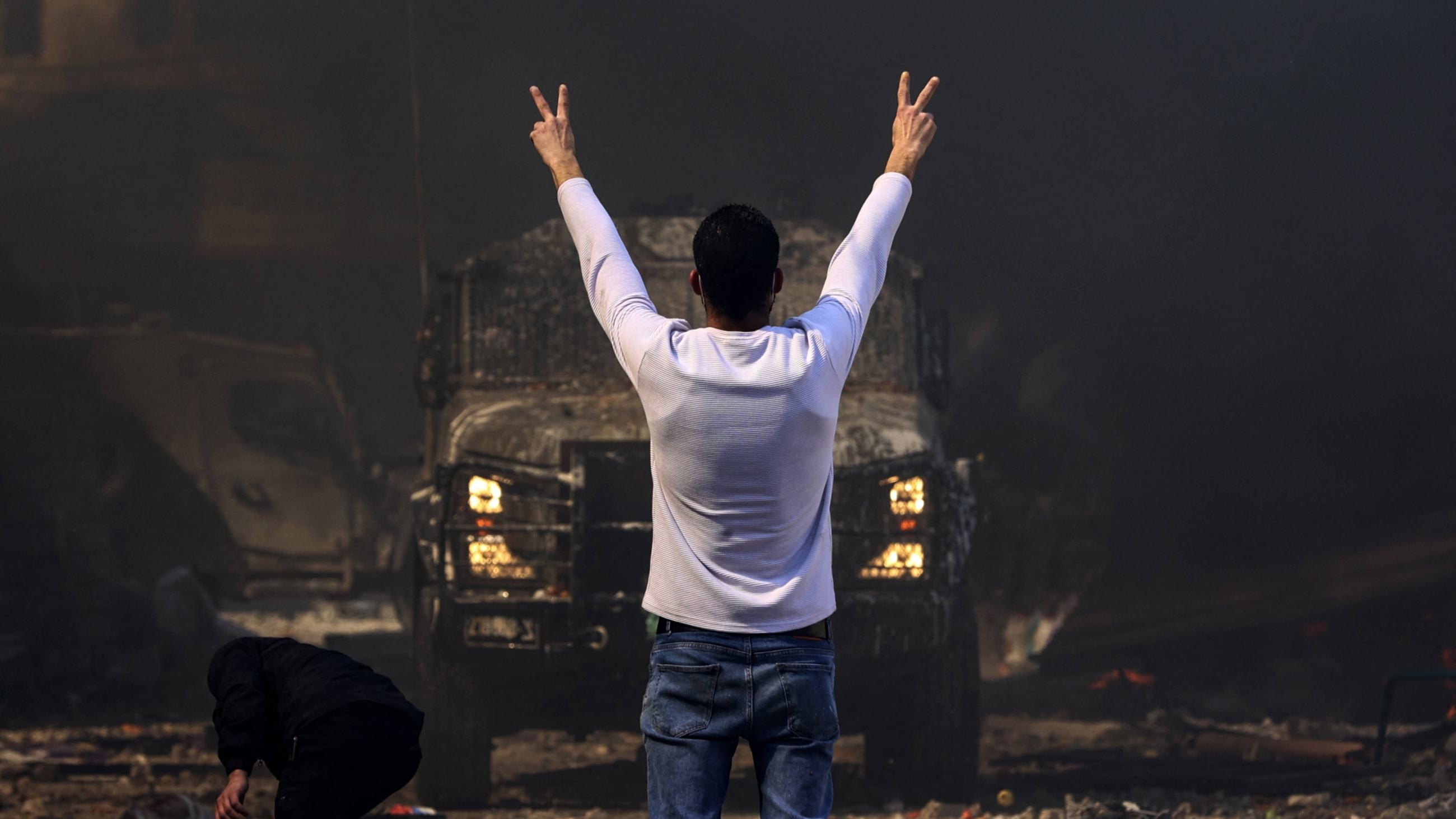
On a calm Wednesday morning, Allam Abdulhaq was cleaning his small shop in the Mreij Street in Nablus, in the occupied West Bank, when he found himself in the middle of a violent Israeli undercover raid.
It took him a few moments before he realised that a group of telecommunication workers that had arrived in his neighbourhood moments earlier was in fact an Israeli forces unit preparing to detain Palestinian fighter Mohammed Hamdan.
The raid, on 22 March, came as part of a series of similar Israeli military raids into various West Bank towns and neighbourhoods that aimed to detain or assassinate wanted Palestinian resistance fighters.
Many of these raids resulted in the killing of several Palestinians, in what Palestinian officials have described as a series of "massacres".
In a trembling voice, Abdulhaq recalled the events of that morning.
New MEE newsletter: Jerusalem Dispatch
Sign up to get the latest insights and analysis on Israel-Palestine, alongside Turkey Unpacked and other MEE newsletters
"I saw two young men dressing like workers of the telecommunication or the electricity company. They were carrying equipment and their clothes were covered in dust and dirt," the 55-year-old shop owner said.
"One of them spoke to his colleague in Arabic then bought a bottle of water. A few moments later, a car with a ladder strapped to its roof arrived and four men got out. They asked the two young men: ‘Ready?’. They responded, ‘Yes, ready’.
"The four then headed to the delivery company in front of my shop, and the other two remained near my shop.
"A few minutes passed before Hamdan came running out of the company, followed by the four men who pointed their guns at him and shot him, then started yelling and cursing him using obscene words."
While Abdulhaq was watching the incident unfold, the two young men pointed their guns to his head, forcing him to turn his back on the scene.
However, he tried to take a look to see if Hamdan, who was shot in the thigh, was still alive.
"I thought that it was a family problem or some kind of row, until military reinforcements arrived in a bus that was carrying undercover agents and Israeli forces. Only then did I realise that what was going on was a military raid to detain a wanted Palestinian man," Abdulhaq told Middle East Eye.
Three weeks after the raid, Abdulhaq seems to still be in shock.
"I was terrified. I have diabetes and I was in a miserable state, so my brother, who is a doctor, called an ambulance," he recalled.
"I cannot forget the voice of Mohammed Hamdan shouting as he was being detained: ‘Say hello to my daughters’. I cannot get him out of my mind."
Disguised to assassinate
Since 2021, the Israeli army has intensified its raids into West Bank towns, where detention and assassination operations are usually conducted by undercover special forces.
Israeli soldiers would appear in Palestinian neighbourhood dressed like locals - including disguised as Muslim clerics, workers, journalists, or medics - to conduct highly secretive military operations.
The undercover forces have since managed to enter Palestinian towns using trucks and vehicles that carried names of Palestinian companies and food factories, or cars with Palestinian number plates.
'I cannot forget the voice of Mohammed Hamdan shouting: ‘Say hello to my daughters’. I cannot get him out of my mind'
- Allam Abdulhaq, shop owner
Surprisingly, most of the raids were conducted at peak hours in overcrowded markets and neighbourhoods, turning them into battlefields.
One month before the undercover raid in Nablus, on 22 February, Israeli forces stormed the city and killed 11 Palestinians.
Disguised as clergy and holding prayer rugs in which they had hid their weapons, Israeli undercover forces entered a crowded market, and headed to the Grand Salahi Mosque, according to eyewitness accounts.
The special forces then left the mosque and moved towards a nearby building where Palestinian fighters were said to be located, before they were joined by large military reinforcements.
The house was besieged, and missiles were fired at the building, while Israeli snipers were spotted in the vicinity.
An Israeli military helicopter was also seen hovering over the city.
Undercover in broad daylight
Three weeks later, on 16 March, a similar raid was conducted in the West Bank city of Jenin, although with some variations.
On a busy Thursday afternoon on Abu Baker street, where Jenin's central market is usually crowded before the weekend, four gunmen alighted from a vehicle and opened fire at the crowd of shoppers and pedestrians, as they targeted two Palestinian resistance fighters.
The two men - identified as Nidal Khazem, 28, and Youssef Shreim, 29 - had left the Jenin camp that day, where they had been in hiding, to visit a barber shop and a sweet shop in the city.
They were on a motorcycle when they were killed, along with two others, including a 16-year-old boy. Twenty three others were also wounded in the raid, according to the Palestinian health ministry.
"Everyone was screaming and crying and running everywhere. Women and children were terrified, while men were trying to protect us and get us inside the shops to avoid being shot," said Sora Abu al-Rob, who was leaving a dental clinic when the incident occurred.
"I decided to go back to the clinic. I thought that maybe it would be safer than the street. But the clinic’s window was directly overlooking the roof of the opposite building, where resistance fighters hid behind water tanks and clashed with the special forces.''
Abu al-Rob and other patients in the clinic took shelter from the shooting in one of the corridors.
'Raids are nothing new to the Palestinian people, but what made it horrific that time was that it occurred in the middle of an overly crowded market'
- Sora Abu al-Rob, Jenin
Before visiting the clinic, Abu al-Rob had met with friends she had not seen in seven months.
"We walked in the city’s neighbourhoods and talked about how much we love it, and about the intimacy we feel being in it. But this intimacy vanished in the blink of an eye, and turned into fear and horror," she recalled.
"[When the shooting started] I tried to reach out to my friends to make sure they were ok, but I could not," she said.
"[Military] raids are nothing new to the Palestinian people, but they are usually conducted on the outskirts of cities and neighbourhoods.
"What made it horrific that time was the fact that it occurred in the middle of an overly crowded market."
Following the incident, Abu al-Rob said in a Facebook post: "This is a scene that we do not get used to, no matter how many times it occurs. These grieving voices do not disappear with time. This huge loss does not fade with time. Rather, they generate fear, hatred, long revenge, and perhaps...a little hope."
‘You’re a Palestinian, you’re a target’
As soon as a raid begins, Mohammed Ordonia, a football coach and photographer, puts on his paramedic suit and rushes to the field to treat the wounded.
In such events, Ordonia says that he and his fellow paramedics "forget the fear" as their first concern and priority becomes "saving lives".
The 28-year-old paramedic and several of his colleagues, who were part of a medical relief team of 25, were present in the the Bab al-Saha area in Nablus the day of the 22 February raid.
"We had been dispersed across multiple areas to ensure that we could respond to any injury cases throughout the areas of clashes," Ordonia told MEE.
'Paramedics are always in the occupation’s bank of targets'
- Mohammed Ordonia, paramedic
"We treated a large number of wounds caused by live bullets, rubber bullets, and tear gas canisters."
Ordonia said that during military raids, Israeli forces do not differentiate between paramedics, civilians, and resistance fighters.
"You’re a Palestinian, you’re a target. Paramedics are always in the occupation’s bank of targets," he added.
His fellow paramedic, Hamza Abu Hajar, was seriously wounded in the liver and spleen while he was trying to treat a wounded Palestinian in December.
"I do not stop thinking of what would happen if I were to be in his place one day," Ordonia said. "But once we receive the call to save the wounded, and the moment I wear my paramedic suit, I perform ablution and pray, then I rush to the field. At that moment, these thoughts stop, and I forget about death."
In many cases, ambulances are targeted by Israeli gunfire or prevented from evacuating the wounded and reaching the hospitals.
"Many of the wounded arrive in private cars rather than ambulances. In such events, the youth of the camp, who also resist the occupation, work as paramedics," said Nawal Anboussi, a public relations officer at the Ibn Sina Hospital, adjacent to Jenin camp.
The aftermath of grief
Away from street battles, a different type of battlefield takes place in hospitals during raids.
"As soon as the raid begins, the hospital near the scene of the incident prepares to receive the wounded. Doctors from all departments are called upon to ensure that they are fully equipped to receive and treat all injuries, working tirelessly to save lives," Anboussi said.
The emergency rooms become crowded with victims and their families who rush to the hospitals to see whether their sons are among the victims, and whether they are alive.
The wounded arrive one after another, leaving doctors exhausted in their attempts to save those who are seriously wounded. Their voices can be heard echoing throughout the hospital, calling for blood donations, or asking nurses to transfer the wounded to operating rooms or intensive care units.
"Relatives of the wounded wait in the emergency department, not knowing if their fathers, brothers or sons would survive. But the harshest scene I have experience was when I comforted a mother of a seriously wounded young man, telling her that he was going to survive, only to know, ten minutes later, that he had passed away," Anboussi recalled.
"There are only a few moments between the hope of survival and the fear of loss."
Last year, Anboussi took part in shrouding Palestinian journalist Shireen Abu Akleh after she was assassinated by Israeli forces, an experience she still cannot believe she had lived through.
"I was shocked by what happened, and as I was shrouding her, I still could not believe it. Everyone who saw me that day told me that I appeared to be unwell."
A few hours after each military raid, and after the special forces retreat, doctors continue to perform their utmost to save the wounded, while the dead are mourned and buried.
The entire city usually falls into a state of deep grief, and shops close down as most West Bank cities observe a general strike.
Military funerals are held for resistance fighters who are killed during clashes with Israeli forces to honour their struggle against the occupation, and scores of residents go to the streets to attend funerals, chanting for Palestine and the victims, and threatening the Israeli occupation with retaliation.
This article is available in French on Middle East Eye French edition.
Middle East Eye delivers independent and unrivalled coverage and analysis of the Middle East, North Africa and beyond. To learn more about republishing this content and the associated fees, please fill out this form. More about MEE can be found here.


